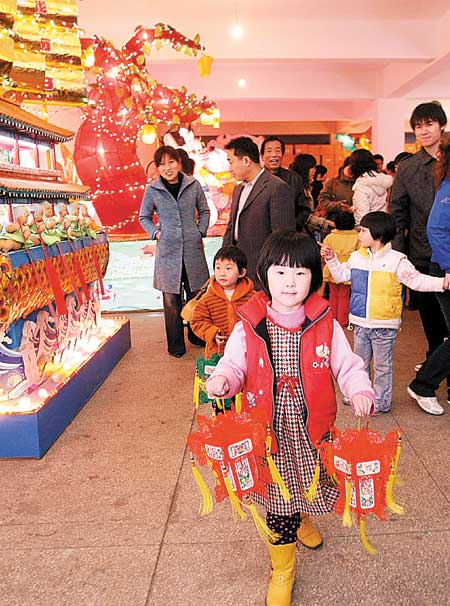

 |
|
Customers come to Tuntou village to buy lanterns as Lunar New Year decorations. |
He learned the craft from his father and founded Gaocheng Palace Lanterns Design and Development Co, Ltd, in 1984. It has grown to become the world's largest palace lantern producer with assets exceeding 19 million yuan ($3 million).
Lanterns have made remote Tuntou wealthy enough to get traffic jams, says village Party secretary Su Zhenguo, who also owns a lantern factory.
About 80 percent of residents have cars, and roughly 30 percent drive two. Typically, one is a family vehicle and another is a company van.
The average income among the nearly 6,000 villagers is about 15,000 yuan a year - far more than what an average Chinese farmer earns.
Youth can earn up to 150 yuan a day. Retired women can get about 70 yuan.
Currently, 110 employees make lanterns in his 16,000-square-meter factory.
An average employee's wage is about two-thirds of the bosses', Su says.
That includes thousands of migrant workers from nearby villages. "Villagers don't have to migrate from here," Su says.
"Instead, villagers migrate to here."
More than 10,000 people from some 1,000 families work in the sector. They produce more than 90 percent of the world's palace lanterns.
The research and development that forms the basis of Zhang's intellectual property rights are local. There are no outside designers, Su says.
Village-wide, the industry sells a billion yuan worth of lanterns a year, Su says. Twelve-meter-high lanterns sell for up to 80,000 yuan, while 3-cm-high models cost 8 yuan a pair.
Villager Li Yuping, who owns a small lantern-making company, says: "Chinese people want to decorate more as they become wealthier."
The local government offers preferential treatment, such as bank loans, to those who enter the sector.
Some might argue the IPRs contributed to Tuntou's prosperity - but Zhang is not among them. "Only one small factory has paid for the rights," he says.
"So, it can't be said my IPRs have made the village richer."
But he believes patents preserve heritage.
"Otherwise, the quality of the lanterns would vary. And competition could become malicious. That would hurt heritage. IPRs have made my company rich enough to develop new innovations on tradition."
He says the fee to use his patented designs is low but refuses to disclose the amount.
| Crafting a town | Walk the talk |